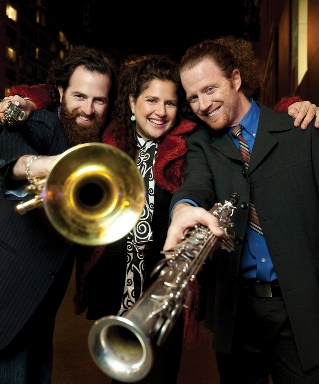Yuval Cohen has probably been asked the question hundreds of times. But one simply has to ask; and he answers with the charm and wit of someone approaching the query for the very first time.
“It’s great, because you are family, and the family stays with your greatest love, which is music,” he tells me during our telephone conversation a few days ago. “If you can combine the two, music and family, there’s nothing at all like this. This is the essence. And also, there is the past and the present. We do it here, now, but we also connect to our childhood too. So you are both a child and a grown up.”

Cohen. a soprano saxaphonist, is the oldest of the three siblings that make up perhaps the pre-eminent family of contemporary Israeli jazz, the Cohens. Sister Anat is an acclaimed clarinetist and tenor saxophonist; “baby” brother Avishai has played the trumpet professionally since the age of 10. They’ve played together since childhood, guested on each other’s projects, and for the last 10 years formed the nucleus of sextet The 3 Cohens. Their most recent album, the warmly received Tightrope, intersperses original compositions with interpretations of favourites from Ellington, Monk, Falmer and others. This Friday, the 3 Cohens Sextet will be playing at the Israel Opera House as part of its Jazz Series.
In its positive review of Tightrope, Downbeat likens the album to “a wonderfully boisterous family dinner, where the two brothers and their sister chat – in, around and through each other.” It is an album that very much suggests intuitive trust. This is heightened by the largely a-cappella performance, the three horns intertwining and intermingling without a rhythm section. There’s nowhere to hide, once stripped of the props that might smooth over bumpy transitions and fluffed phrasing. As its title proposes, the album works thanks to two specific elements incorporated by the Cohens into their artistry; the element of risk and the absolute need for balance.
“That’s what we feel when we play,” Cohen says. “(The album) recalls when we were kids, when we played together and allowed the melodic lines interweave between themselves.” It does go further, though. It suggests implicit confidence in each other’s ability, the capacity each has to rely upon one another completely. And to be relied upon completely. The Cohens clearly have fun playing with and off against one another on the album, but this privilege comes with responsibilities attached “When we play the album, it is like an acrobatic performance,” Yuval elaborates. “It’s a mysterious risk that we take, and within this unknown you create a balance.” It is collaboration taken to its logical, yet exhilaratingly inchoate, finite point. “You do something and the other person responds. We do it, it is fun, it is a delight.”
Tightrope feels in some ways like a departure from their previous albums – One, Braid and Family, from 2004, 2007 and 2011 respectively. It’s in part the a-cappella character that defines the album. Cohen observes that the routine has long had a place in their live performances. “At some point we brought it into the bandstand, just the three of us playing, and we loved it. It feels natural, and it became a part of our gigs. And,” he continues, laughing, “it lets the rhythm section take a break.” Might there also be something of a melancholic air about the album? Yuval gently pushes back from this interpretation. “I don’t think that it is, not necessarily,” he replies. “Something about the jazz musician is that you can bring attitude to everything that you play – joyous or melancholic or…” The same applies to the listener. it can be as much whatever one allows oneself to take from it. And it is this that sets jazz apart from other musical forms.
Friday’s concert will also feature Yonathan Avishai on piano, Ruben Rogers on bass and Jonathan Blake on drums. All three go back a long way with the Cohens. “Yonathan grew up with us, and played with Avishai on Third World Love (the genre-blending four piece also featuring Omer Avital and Daniel Freedman.) Both Rogers and Blake have played with the Cohens, individually and collectively, over the years. “Great musicians, long relationship. We’re looking forward to spending time together.”
This isn’t to suggest a cozy complicity borne out of familiarity, though. Cohen is quick to note that risk, whilst central to Tightrope, is an integral aspect of Jazz in general. “Risk is part of being a jazz musician. It’s not just the Cohens, it is every jazz musician,” he points out. “When you start a solo, you don’t know where it might go and what is going to happen. In that context, every jazz musician takes risks. And the more you learn, the more you are able to take more, or different risks. That’s what makes Jazz so passionate.”
Passion characterises the Israeli Jazz scene. Given the size of the country, it is readily acknowledged that it punches above its weight, its remarkable depth of playing talent – many of international renown – complemented by knowledgeable and passionate audiences. Why so? Cohen – who, aside from being a principal player, teaches at conservatories and schools in Jerusalem and Tel Aviv – is in a good position to say. In some ways, he says, it is counter-intuitive. Jazz started as the original music of black America, is very much true American music. Still, he has colleagues from the States “that say that when they are looking for the best talent, they buy a ticket to Tel Aviv.” Why? One reason is the established teaching system, starting with dedicated high schools for arts and music like the Thelma Yellin High School for the Arts in Givataim, and the Rimon School for Jazz and Contemporary Music in Ramat HaSharon (Yuval studied at the first, and teaches at the second); “Teachers spent a lot of time in the States, and brought their talent back to Israel.” Another, evidently, are the appreciative audiences. Yuval references dedicated venues like Beit Ha Amudim, in Tel Aviv. “You go to a show, and you can see hundreds of people, and say, ‘How?’”
But there is something else. Yuval refers to a “secret ingredient”, a certain indescribable quality. As we talk, I start to wonder to myself. Israelis, for good and for bad, are often typified by a “can-do” attitude: go for it, deal with the consequences if it doesn’t work out later. It’s an interesting relationship with risk; it makes the difference to albums like Tightrope, and quite possibly might have a deeper influence on the wider world of Israeli Jazz.
The 3 Cohens will be performing at the Israel Opera House, as part of its Jazz Series, on 20.6.14 at 2200. Further information and tickets at
http://www.israel-opera.co.il/Eng/?CategoryID=701&ArticleID=1951





